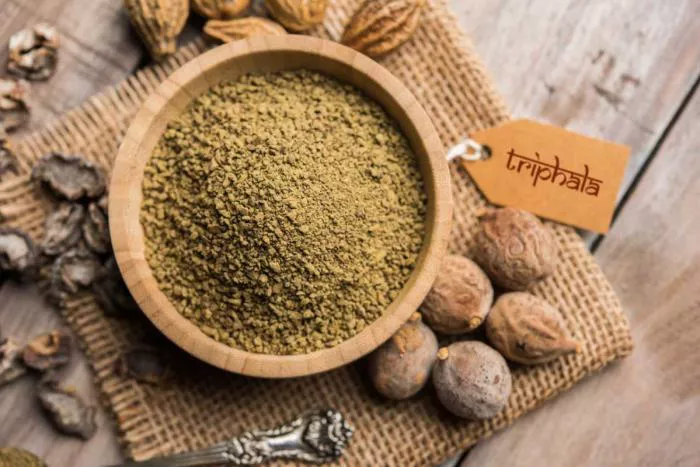Breastfeeding is a critical period for both mother and baby. The mother’s diet and lifestyle choices directly impact her health and the quality of breast milk. Many mothers wonder if using Triphala powder is safe during breastfeeding. Triphala, a popular Ayurvedic remedy, is known for its numerous health benefits. However, its safety during breastfeeding is a topic that requires careful consideration.
This article explores the potential effects of Triphala powder on breastfeeding mothers and their babies. It also provides insights into safe practices for its use.
What Is Triphala Powder?
Triphala is a traditional Ayurvedic formula made from three dried fruits: Amalaki (Indian Gooseberry), Bibhitaki, and Haritaki. These fruits are combined in equal parts to create a potent powder with various health benefits.
Triphala is widely used for:
- Improving digestion
- Detoxifying the body
- Supporting immune health
- Promoting weight loss
- Regulating bowel movements
The combination of these fruits provides a rich source of antioxidants, vitamins, and minerals. Triphala is also valued for its anti-inflammatory and antimicrobial properties.
Why Consider Triphala Powder During Breastfeeding?
New mothers often experience a variety of health challenges after childbirth. These may include constipation, digestive issues, fatigue, and weight management concerns. Triphala is considered a natural remedy for such issues, as it helps:
- Relieve constipation
- Improve digestion and nutrient absorption
- Increase energy levels
Many mothers turn to Triphala as a natural solution to improve overall health and well-being. However, its effects during breastfeeding need to be understood more deeply.
Can Triphala Powder Affect Breast Milk?
The safety of consuming Triphala during breastfeeding depends on various factors, including the dosage and the mother’s overall health. Triphala’s ingredients are generally safe in moderate amounts, but certain properties may raise concerns.
Laxative Effect
Triphala is known for its mild laxative properties. While this can be helpful for mothers dealing with constipation, excessive use may cause dehydration. This, in turn, can reduce milk supply or alter its composition.
Detoxification
Triphala is considered a detoxifying agent. Detoxification processes can sometimes release toxins into the bloodstream, which may be passed to the baby through breast milk. This makes it essential to use Triphala cautiously during lactation.
Taste of Breast Milk
The strong taste of Triphala may affect the flavor of breast milk. Some babies may dislike this change, which could lead to feeding difficulties.
Potential Benefits of Triphala Powder for Breastfeeding Mothers
When used appropriately, Triphala may offer several benefits to breastfeeding mothers:
Improved Digestion
Breastfeeding demands a significant amount of energy, and good digestion is key to meeting these needs. Triphala supports digestive health, helping mothers absorb nutrients more effectively.
Boosted Immunity
The antioxidants in Triphala can help strengthen the immune system, protecting the mother from illnesses that may affect her ability to care for her baby.
Natural Weight Management
Postpartum weight gain is a common concern for many mothers. Triphala’s metabolism-boosting properties may aid in gradual, healthy weight loss.
Energy Restoration
Triphala may combat fatigue by improving the body’s overall functioning, providing new mothers with the energy needed to care for their babies.
Risks and Precautions When Using Triphala Powder During Breastfeeding
While Triphala has many benefits, there are potential risks for breastfeeding mothers and their babies. These risks can often be minimized by following safe practices.
Consult a Healthcare Provider
Always consult your doctor or a certified Ayurvedic practitioner before adding Triphala to your diet. They can advise on whether it is safe for you and your baby, considering your individual health needs.
Use Low Doses
Begin with small amounts of Triphala to monitor its effects on your body and your baby. Avoid high doses, as they may increase the risk of side effects.
Avoid Long-Term Use
Prolonged use of Triphala is not recommended during breastfeeding. Its detoxifying properties may lead to undesirable effects on your baby over time.
Monitor Your Baby’s Health
Pay close attention to any changes in your baby’s behavior, feeding patterns, or digestion. If you notice signs of discomfort, consult your pediatrician immediately.
Stay Hydrated
Since Triphala has laxative properties, it is essential to drink plenty of water to prevent dehydration, which could affect milk supply.
Alternatives to Triphala Powder
If you are concerned about using Triphala during breastfeeding, there are alternative natural remedies that can address common postpartum issues:
Fiber-Rich Foods for Constipation
Foods like oats, flaxseeds, and leafy greens can improve digestion without the risks associated with Triphala.
Ginger Tea for Digestion
Ginger is a safe and effective remedy for improving digestion and boosting energy levels.
Fenugreek for Milk Supply
Fenugreek seeds are often recommended to enhance milk production naturally.
Turmeric for Immunity
Turmeric’s anti-inflammatory and immune-boosting properties make it a great alternative for breastfeeding mothers.
Final Thoughts
Triphala powder offers numerous health benefits, but its use during breastfeeding requires caution. While it can help with digestion, energy, and immunity, its detoxifying and laxative properties may pose risks to both mother and baby. Always consult a healthcare provider before incorporating Triphala or any supplement into your postpartum diet.
Breastfeeding is a delicate phase that demands careful dietary choices. By prioritizing safety and seeking professional guidance, you can ensure the best outcomes for yourself and your baby.
Related Topics:


